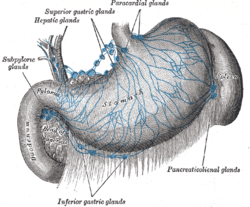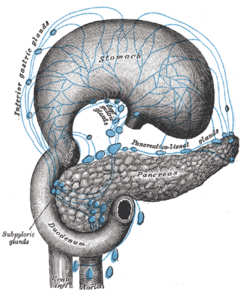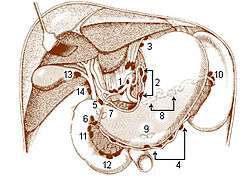Hepatic lymph nodes
The hepatic lymph nodes consist of the following groups:
- (a) hepatic, on the stem of the hepatic artery, and extending upward along the common bile duct, between the two layers of the lesser omentum, as far as the porta hepatis; the cystic gland, a member of this group, is placed near the neck of the gall-bladder;
- (b) subpyloric, four or five in number, in close relation to the bifurcation of the gastroduodenal artery, in the angle between the superior and descending parts of the duodenum; an outlying member of this group is sometimes found above the duodenum on the right gastric (pyloric) artery.
| Hepatic lymph nodes | |
|---|---|
 Lymphatics of stomach, etc. | |
 Lymphatics of stomach, etc. The stomach has been turned upward. | |
| Details | |
| System | Lymphatic system |
| Drains to | Celiac lymph nodes |
| Identifiers | |
| Latin | Nodi lymphoidei hepatici lymphoglandulae hepaticae |
| Anatomical terminology | |
The lymph nodes of the hepatic chain receive afferents from the stomach, duodenum, liver, gall-bladder, and pancreas; their efferents join the celiac group of preaortic lymph nodes.
Additional images
 Visceral Nodes of the Abdominal Cavity
Visceral Nodes of the Abdominal Cavity
References
This article incorporates text in the public domain from page 706 of the 20th edition of Gray's Anatomy (1918)
This article is issued from
Wikipedia.
The text is licensed under Creative
Commons - Attribution - Sharealike.
Additional terms may apply for the media files.